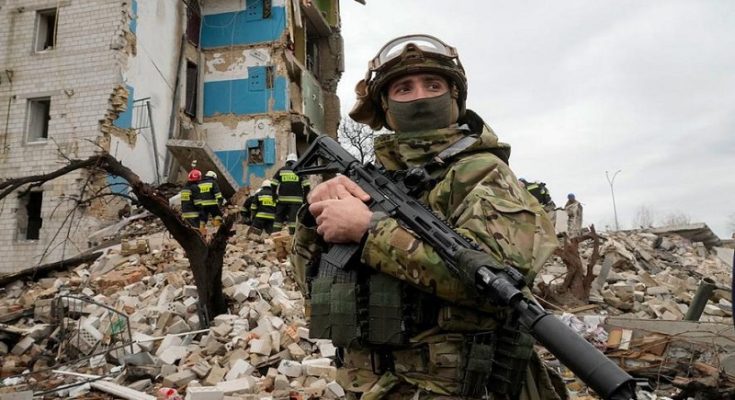By Sanjay Kumar
War achieves its goals by death and destruction. Hence, it is not surprising that it elicits strong moral reactions. Even in mythology, Arjuna asks Krishna if any war is worth fighting on the eve of the Mahabharata war.
Currently, a devastating war is on in the Donbas region of eastern Ukraine. According to reports from Ukrainian officials, heavy Russian artillery and rocket attacks are killing and wounding up to a thousand Ukrainian soldiers daily.
Many soldiers describe the situation as hell on Earth. Demands of morality, in this case, seem straightforward: denounce the invader and support those defending their country.
That is not, however, how the world is reacting. Responses to this war are mired in paradoxes.
An overwhelming number of countries in the Global South, Latin America, Africa and Asia, where most of humanity lives, have refrained from condemning the Russian invasion. Outright condemnations of Russia have been limited to the advanced capitalist countries of the G7 and most European countries that are members of NATO.
These countries, which are helping Ukraine with weapons and training, were also involved in most of the invasions and bombings of the past thirty years in Yugoslavia, Afghanistan, Iraq, Libya, and Syria.
Therefore, it is difficult to accept their condemnation of the Russian invasion as motivated by a moral rejection of war.
Morally questioning war apart, the reality is that war has been a policy instrument of powerful states ever since the beginning of civilisation. The more powerful a state is, the more it spends on preparing for war.
- वर्कर्स यूनिटी को सपोर्ट करने के लिए सब्स्क्रिप्शन ज़रूर लें- यहां क्लिक करें
- यूक्रेन : कमजोर होती साम्राज्यवादी ताकतें और विकसित होते क्रांतिकारी हालात- नज़रिया
Today, the G7 countries centred around the United States and countries like Australia and South Korea spend 56% of the global expenditure on arms and armaments but account for just 12% of humanity.
Ever since the United States gained unipolar dominance over the world after the collapse of the Soviet Union in 1991, there has hardly been a time when it and its NATO cohorts are not waging war or engaged in covert operations against one country or another.
These wars are waged to secure the political and economic interests of today’s imperialism. Sovereign nation-states are the second set of politico-economic institutions among whom war is believed to be legitimate.
Depending upon their resources, ambitions and perceived threats, all modern nation-states have elaborate security apparatuses and consider war a necessary element of state policy.
The ubiquitous presence of war as a state policy instrument implies that states respond to any war, including those in which they are not participants, through the calculus of available policy options. Hence, to expect a moral response to war from any state, as some liberal commentators demand, is wishful thinking.
The G7 and NATO countries had responded vehemently to the Russian invasion because they had been directly involved in the anti-Russian actions of the Ukraine government before the war and publicly asserted their commitment to Ukraine’s security.
Further, they see the Russian invasion as a direct challenge to their imperialist world domination.
The governments of many other countries are refraining from taking an open position against Russia because of its central role in global commodity markets and its long-standing defence relations with many of them.
These countries are also looking for economic and geopolitical openings this war may make available to them.
War and Mass Politics
If any state’s response to war is essentially amoral, what about mass politics and popular ideology? These appear eminently appropriate to develop a moral response to war. After all, don’t we all wish to be moral when judging events around us?
This, too, is easier said than done. Wars of our time are condensates of conflicts among nation-states and between nation-states and imperialism.
These conflicts occur at various levels in diverse dimensions. Any moral stance that does not take account of the objective complexity of these conflicts runs the risk of being uncritically one-sided.
Two factors complicate an objective assessment of conflicts and tendencies that lead to war. One, the war-making institutions, i.e., imperialism and nation-states, also propagate ideologies of war which attempt to justify their wars. All create a moral story of a good ‘us’ versus an evil ‘them’.
Without confronting and dismantling such ideological constructs, morally consistent response to war is impossible.
The second difficulty is more intimate and arises from the exclusionary form of our most common moral judgments, which tend to put parts of the world around us into a binary framework of good versus bad.
Any complex reality resists binary framing of this kind. Arjuna faces a moral dilemma because he knows that to get his rightful share of the Kuru kingdom, he must fight the war, while he can also see he can achieve that goal only through the death and destruction of his kinsfolk.
A simple yes-or-no cannot resolve his dilemma to the imminent war. He needs to realise that the source of the internecine war he faces lies in clan-based kingship.
This institution informs what he thinks is rightfully his. His dilemma would persist unless he finds a way out of the institution.
Differences Between Wars of Imperialism and Nation States
The nature of war in our time is far more complex than a direct face-off between the two armies described in the Mahabharata.
An important fact is an immense difference between the war-making capabilities of different nation-states and between them and the imperialist block. When the asymmetry between warring parties is not massive, as between India and Pakistan, the weaker party can still have surprises up its sleeve, which limits the options available to the stronger party, thereby reducing the possibility of war.
The victims of imperial aggression have no practical means to respond in militarily. Hence, imperialists enjoy absolute freedom of operations. For them, war is a low-cost affair, which they often actively seek.
This difference in the nature of war has a crucial ideological complement. Nation states at war frame their actions mainly in terms of perceived threats from the other party or to correct some pre-existing “wrong”.
That is, such wars are justified in terms of specific interests. Victims of imperialism pose no military threat to imperialist countries. The latter’s aggression is justified in terms of universal values, which undoubtedly enjoy comprehensive appeal.
In the last three decades, the defence of human rights and democracy and threats to regional peace has been favoured justifications for imperialist aggressions.
The difference between the specific interests of nation-states and universal claims of imperialism is most clearly visible in the recent escalation over Taiwan.
The United States is justifying its military support to Taiwan as the defence of a small democratic country from an expansive and authoritarian neighbour. China sees Taiwan as a specific issue of its national re-unification, a leftover from its civil war when the reactionary Chiang Kai-shek fled to Taiwan after defeat by the mainland Communists to establish his regime under the protection of the United States military umbrella.
Hybrid Wars in Peacetime
Another relevant factor is the diversity of means of warfare available to today’s war-makers. What Vijay Parshad has called hybrid wars include media-based information war, economic coercion and sanctions, proxy wars by third parties, funding and training of rebel groups, and military coups.
While other forms contain a clear hostile intent and action, economic sanctions are often seen as preventive rather than an open act of aggression.
This is surprising because economic sanctions or blockades were effectively used for the first time in World War I as a weapon against Central European and Middle Eastern powers.
The death of hundreds of thousands of civilians from hunger and disease underlined their potency. As Nicholas Mulder notes in his excellent book, The Economic Weapon: The Rise of Sanctions as a Tool of Modern War, a qualitative shift in the attitude towards economic sanctions occurred after the first world war.
Then, victors transformed sanctions into a peacetime coercive measure through Article 16 of the Covenant of the League of Nations. Mulder considers this transformation the most enduring legacy of 20th-century liberal internationalism.
Economic sanctions are now part of international law through Article 41 of the United Nations Charter, allowing the Security Council to impose them on warring parties, groups, or countries in extreme cases.
While the United Nations has used this legal route very sparingly, the imperialist block led by the United States has been exceptionally active in imposing unilateral sanctions. The targeted country is disallowed from trading with the imperial block through secondary sanctions, while other countries are also prevented from trading with the targeted country.
That is how Cuba, Iran and Venezuela are barred from international trade. The foreign assets of Venezuela, Iran, Afghanistan and Russia, running into hundreds of billions of dollars, have been unilaterally seized.
The seizing of foreign assets and peacetime blockades by forcing other countries to not trade with a targeted country are acts of war.
Their proliferation in the 21st century signifies the intricate relationship between war and peace in our time.
Pitfalls of a ‘Moral’ Response to War
The complexities of the context and nature of current warfare often lead to responses that appear moral but, in reality, support the tendencies that lead to war.
Wars happen because someone decides to go to war. Even though the decision to launch a war of aggression, like the Russian invasion of Ukraine, must be condemned, if the desire to punish makes one overlook systemic tendencies, the result is a passionate defence of wars rather than an argument for peace.
In the current context, this is happening with many progressives from the imperialist block, which is surprising because many have otherwise taken principled stands against recent imperialist aggressions. In the United States, Bernie Sanders and the progressive caucus have voted for funding weapons for Ukraine.
In France, the left-wing presidential candidate Jean-Luc Melenchon is aligned with NATO, and in Germany, even though De Linke (The Left) voted against sending weapons to Ukraine in the Bundestag, the leaders of the Rosa Luxemburg Stiftung think the Russian invasion has transformed NATO into “an anti-imperialist defensive alliance”, in light of Sweden and Finland deciding to join it due to a perceived threat from Russia.
They fail to recognise that irrespective of what Russia does, NATO remains an imperialist geopolitical alliance. These people appear to have bought the imperialist ideological construct of Russian President Vladimir Putin as evil incarnate and are standing with NATO plans to escalate the ongoing war.
Jeremy Corbyn is the only honourable exception in the mainstream Western Left who has argued against NATO sending weapons to Ukraine and emphasised diplomatic efforts for a ceasefire.
The selective amnesia about the objective context of this war is mirrored in those who soften condemnation of the Russian invasion by arguing that NATO provoked Russia into a war.
They fail to notice that the state capitalism of Putin’s Russia is dominated by a militarised security apparatus prioritising military options.
This apparatus is dangerous for Russians and their neighbours. It is unsurprising that in many countries, right-wing populist groups have come out against the anti-Russia policies of their governments.
In the Bundestag, with the Left, the neo-Fascist AfD voted against sending weapons to Ukraine. Anti-imperialist progressives also overlook the militarist nature of the Russian state. They see this war in light of receding United States hegemony and an emerging multipolar world.
Peace as a Moral Response to War
The kind of peace it advocates is the litmus test for any moral response to war. The absence of war is not necessarily peace. Otherwise, a victor’s peace based on the humiliation of the defeated or peace under the jackboots of an empire like Pax Romana or Pax Britannia would be ideal.
If wars today occur due to objective tendencies of the global political-economic system, so can an enduring peace emerge only from objective factors.
The worker’s internationalism of the 19th and 20th centuries was one political action programme that directed revolutionary politics of the working classes against national chauvinism to imagine peace on a global scale.
The sharpest representation of worker internationalism was given in the thesis of revolutionary defeatism by Lenin and Rosa Luxemburg during the First World War.
They viewed this war as butchery spearheaded by reactionary ruling classes of combatant nations for colonial control over the world. In Lenin’s words, during a war like this, “A revolutionary class cannot but desire the defeat of its government.”
The slogan overcame the zero-sum logic of any war (victory of one party is the defeat of the other) by proposing that when the proletariat of all countries adopt it, the war will implode into the destruction of ruling classes everywhere.
The slogan received success in Russia and partial success in Germany and Hungary.
Today’s world is markedly different from the early twentieth century. Imperialism is not riven by internal rivalries but exists as a block under the United States hegemony.
The rest of the world is ruled primarily by sovereign nation-states, which show varied relations of dependence on and challenge to imperialism. Besides, working-class politics and its internationalism has collapsed everywhere.
Still, since the mainsprings of war are still systemic, only a radical programme that challenges the current global system can usher in substantive peace. What Lenin and Luxemburg did in their time should be the core of a moral response to wars today.
(वर्कर्स यूनिटी के फ़ेसबुक, ट्विटर और यूट्यूब को फॉलो कर सकते हैं। टेलीग्राम चैनल को सब्सक्राइब करने के लिए यहां क्लिक करें। मोबाइल पर सीधे और आसानी से पढ़ने के लिए ऐप डाउनलोड करें।)



